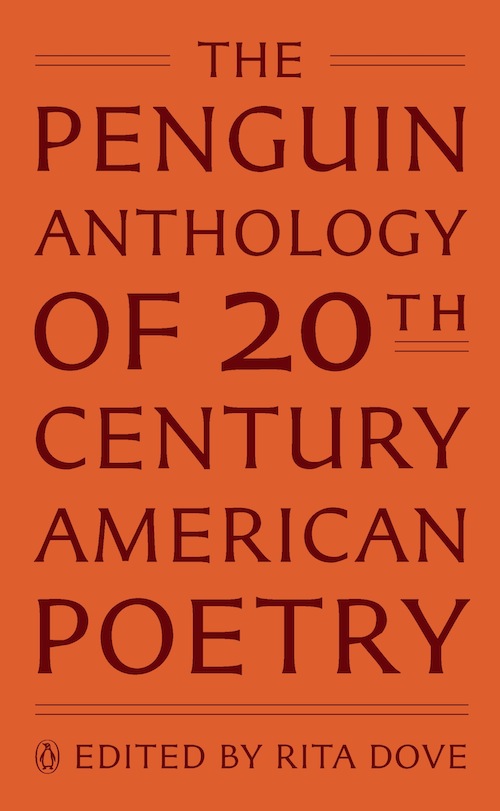Evie Shockley on the Penguin Anthology of 20th Century American Poetry

Evie Shockley contributed this fantastic analysis of the Penguin Anthology of 20th Century American Poetry, published in 2011, edited by Rita Dove, to the Boston Review. Mostly, Shockley spends a stupendously thorough amount of time in her write-up dissecting Marjorie Perloff and Helen Vendler's responses to this anthology and laying out what's at stake for the everyday reader. (Thank you, Evie!)
On Dove's Anthology and the backlash that it has received from Helen Vendler and Marjorie Perloff, Shockley writes:
When Helen Vendler’s and Marjorie Perloff’s names appear in the same sentence, they are often being held up as polar opposites: the academy’s two “grandes dames” of poetics scholarship whose geographical locations—Vendler on the East Coast and Perloff on the West—suggest the distance between the aesthetics they have championed over long, estimable careers. Vendler has devoted her considerable skills to interpreting the works of such widely acknowledged masters of lyric poetry as Shakespeare, Walt Whitman, Emily Dickinson, W. B. Yeats, and Wallace Stevens, while Perloff has placed her intellect most definitively at the service of the avant-garde poetics practiced by such twentieth-century innovators as Ezra Pound, Gertrude Stein, John Cage, John Ashbery, and Susan Howe. Of course, the two scholars are not without their common enthusiasms and points of agreement, despite their different aesthetic orientations. But their spotlights align with such relative rarity—and glow with such exceptional intensity—that those objects upon which both are focused shine brightly indeed.
One such object is the Penguin Anthology of 20th Century American Poetry, published in 2011 and edited by the widely admired Pulitzer Prize-winning poet Rita Dove. Over the past year and a half, this anthology has been illuminated to the point of burning—not by the simultaneous regard of Perloff and Vendler, but by their mutual disdain. Vendler considered its merits (finding few) for the New York Review of Books, where she regularly publishes reviews. Perloff positioned the volume as an exemplar of the problems she sees in contemporary American poetry, to jump-start an essay making a case for “uncreative writing” (procedural and conceptual poetics that traffic significantly in appropriated language), published in this magazine. Both pieces circulated widely, generating multiple responses and a good deal of impassioned, often thoughtful discussion. This convergence of critical conversation about Dove’s anthology prompts me not to offer a point-by-point rebuttal of their critiques, nor to offer a defense of the anthology Dove produced, nor to unpack the racist implications of the scholars’ claims (separated from the question of intent). Several such responses, well worth reading, already appear in a variety of print and electronic publications. Instead, I want to contend that the commonalities and points of overlap between Perloff’s and Vendler’s takes on the anthology reveal the troubling role of race in U.S. literary culture at this moment. As Toni Morrison does in her incisive book Playing in the Dark, I question what racial discourse makes possible in a literary context, and highlight the way race stands in for matters of class, professional territoriality, and aesthetics at stake in this conversation. Race is not beside the point, but is made, through a trick of mirrors, to shadow all points.
Read on at Boston Review!


